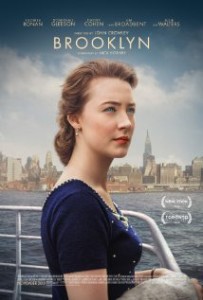by Ben Hargreaves
John Crowley (Boy A, Intermission) directs this story of a young Irish emigrant to the bustling Brooklyn of the 1950’s, adapting Colm Tóibín’s novel of the same name. Saoirse Ronan takes the lead role as Eilis, who decides to leave behind provincial life in Ireland, where the major concern is who shall dance with whom, for the opportunity to travel to Brooklyn in search of a new life. After initially struggling to adjust to her new home, Eilis meets a young Italian-American, Tony (Emory Cohen), and as their romance blossoms so too does Eilis’s confidence and with it a love for the city, until circumstances in Ireland force her to return home.
 Though the casting is impeccable, with Julie Walters (Harry Potter) and Jim Broadbent (Moulin Rouge!) providing pitch-perfect support, it is Saoirse Ronan (Hanna) that stands out with a performance of poise and restraint. In fact, the success of the film largely rests on her shoulders as the focus of the film, and the camera lens, never strays far from its protagonist. This works particularly well in the early parts of the film as Crowley captures the loneliness and seclusion of moving to a new city. However, as the film progresses, the focus upon Eilis stifles the development of the secondary characters and the dramatic tension of Eilis’s choice between the two love-interests is weakened. The two men that attempt to win her affection are unapologetically one-note – with Tony playing the lovable, family-orientated Italian while Jim Farrell (Domhnall Gleeson), as the love-interest on Eilis’s return to Ireland, is barely given the screen-time to develop beyond a wistful and earnest Irishman.
Though the casting is impeccable, with Julie Walters (Harry Potter) and Jim Broadbent (Moulin Rouge!) providing pitch-perfect support, it is Saoirse Ronan (Hanna) that stands out with a performance of poise and restraint. In fact, the success of the film largely rests on her shoulders as the focus of the film, and the camera lens, never strays far from its protagonist. This works particularly well in the early parts of the film as Crowley captures the loneliness and seclusion of moving to a new city. However, as the film progresses, the focus upon Eilis stifles the development of the secondary characters and the dramatic tension of Eilis’s choice between the two love-interests is weakened. The two men that attempt to win her affection are unapologetically one-note – with Tony playing the lovable, family-orientated Italian while Jim Farrell (Domhnall Gleeson), as the love-interest on Eilis’s return to Ireland, is barely given the screen-time to develop beyond a wistful and earnest Irishman.
For a film that concerns itself with themes of significant depth – love, loss and the immigrant experience – it feels like a missed opportunity. The film never manages to satisfyingly grapple with these larger, underlying themes and instead feels cramped by its faithful following of the plot of the novel upon which it’s based. As a result, the film’s ending feels hurried, leaving the viewer begging many questions that the script isn’t able to supply. Perhaps this explains why the opening half of the film, which is allowed time to develop and to linger upon some brilliantly comedic moments, is far superior to the turgid and, at times, bemusing second-half of Eilis’s return to Ireland. The success of first-half of the film only increases the frustration as it displays the obvious potential for the film to be a great example of a love-story addressing wider-issues, and yet finishes being an entertaining but, ultimately, shallow experience.
